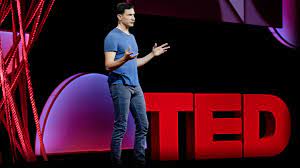We all face problems in our daily lives – big or small. How we approach and solve these problems can greatly impact our personal and professional success. Developing strong problem-solving skills is crucial for navigating the complexities of life and achieving our goals.
In this post, we’ll explore eight captivating TED Talks that offer invaluable insights and strategies for sharpening your problem-solving mind. These talks, delivered by experts from various fields, will inspire you to think differently, challenge your assumptions, and equip you with practical tools to tackle even the most complex challenges.
Talk 1: “The Puzzle of Motivation” by Dan Pink
In this insightful talk, Dan Pink challenges traditional notions of motivation. He argues that the traditional “carrot and stick” approach, which relies on external rewards and punishments, is ineffective for tasks that require creativity and critical thinking.
Instead, Pink proposes that true motivation stems from three intrinsic factors:
- Autonomy: The desire to be self-directed and have control over our work.
- Mastery: The urge to continually improve our skills and become better at what we do.
- Purpose: The yearning to be part of something greater than ourselves and contribute to a meaningful cause.
By understanding and fostering these intrinsic motivators, we can unlock our full potential and approach problems with greater enthusiasm, creativity, and perseverance.
Talk 2: “The Art of Asking Questions” by Andrew Vincent
In this insightful talk, Andrew Vincent, a philosopher and entrepreneur, explores the transformative power of asking questions and its role in fostering critical thinking, creativity, and effective problem-solving.
Vincent emphasizes that while we often seek answers, it is the ability to ask the right questions that truly drives understanding and innovation. He argues that questions have the power to challenge assumptions, uncover blind spots, and open up new avenues for exploration.
Throughout the talk, Vincent shares practical techniques for asking better questions, such as using open-ended inquiries, embracing divergent perspectives, and cultivating a mindset of curiosity. He encourages viewers to move beyond seeking simple answers and instead embrace the process of inquiry itself.
By mastering the art of asking questions, Vincent suggests that we can break free from limiting mindsets, expand our horizons, and unlock new possibilities for solving complex problems. This talk inspires viewers to embrace a questioning mindset, recognizing that the path to true understanding and innovative solutions often begins with the courage to ask the right questions.
Talk 3: “How to Speak Up for Yourself” by Adam Galinsky
Effective communication is a crucial aspect of problem-solving. In this insightful talk, Adam Galinsky shares practical strategies for speaking up and asserting yourself in challenging situations.
Galinsky emphasizes the importance of overcoming the fear of negative evaluation and embracing a mindset of self-promotion. He provides techniques for projecting confidence, such as adopting powerful body language and using precise, assertive language.
Additionally, Galinsky discusses the value of perspective-taking – understanding and acknowledging the viewpoints of others before presenting your own. This approach fosters empathy and increases the likelihood of your ideas being heard and accepted.
By applying Galinsky’s principles, you can improve your ability to communicate your ideas effectively, navigate conflicts, and advocate for solutions that address the needs of all stakeholders.
Talk 4: “How to Stay Calm When You Know You’ll Be Stressed” by Daniel Levitin
Stress is a common obstacle in problem-solving, as it can cloud our judgment and impede our ability to think clearly. In this talk, Daniel Levitin offers practical strategies for managing stress and maintaining composure in challenging situations.
Levitin emphasizes the importance of developing self-awareness and recognizing the early signs of stress. He suggests techniques such as deep breathing exercises, mindfulness practices, and cognitive reframing to help regulate our emotional responses.
Additionally, Levitin discusses the role of preparation and planning in reducing stress. By anticipating potential challenges and developing contingency plans, we can reduce the element of surprise and feel more in control.
Implementing Levitin’s stress management strategies can help you approach problems with a clear and focused mind, enabling you to make better decisions and find more effective solutions.
Talk 5: “The First 20 Hours — How to Learn Anything” by Josh Kaufman
In this engaging talk, Josh Kaufman, an author and entrepreneur, introduces the concept of “rapid skill acquisition” – the idea that with focused effort, anyone can become reasonably proficient at a new skill within 20 hours of practice.
Kaufman outlines a step-by-step process for learning new skills efficiently, including deconstructing the skill into its core components, removing barriers to practice, and focusing on the most valuable aspects of the skill first. He emphasizes the importance of deliberate practice, feedback, and embracing a growth mindset.
This talk provides a practical framework for quickly developing new problem-solving skills and tools. By applying Kaufman’s principles, viewers can accelerate their learning curve and rapidly acquire the knowledge and abilities needed to tackle complex challenges more effectively.
Kaufman’s approach encourages viewers to break free from the mentality of expertise being an unattainable goal, and instead embrace the idea that continuous learning and skill development are within reach for anyone willing to put in the focused effort.
Talk 6: “How to Get Better at the Things You Care About” by Eduardo Briceño
In this thought-provoking talk, Eduardo Briceño explores the concept of purposeful practice and its role in mastering skills and solving complex problems.
Briceño emphasizes the importance of identifying and focusing on the specific areas where improvement is needed. He encourages us to embrace a growth mindset, recognizing that skills can be developed through deliberate practice and feedback.
Additionally, Briceño discusses the value of creating stretch goals and stepping outside of our comfort zones. By challenging ourselves and embracing discomfort, we can accelerate our learning and problem-solving abilities.
This talk provides practical strategies for continuous improvement and reminds us that mastery is a lifelong journey that requires dedication, resilience, and a willingness to learn from our mistakes.
Talk 7: “The Power of Introverts” by Susan Cain
In a world that often celebrates extroversion, Susan Cain’s talk sheds light on the unique strengths and problem-solving capabilities of introverts.
Cain challenges the misconception that extroversion is inherently better for success and leadership. She highlights the qualities that make introverts exceptional problem-solvers, such as their ability to listen deeply, think critically, and work independently without the need for constant external stimulation.
Additionally, Cain emphasizes the importance of creating environments that accommodate and leverage the strengths of both introverts and extroverts. By fostering an inclusive culture that values diverse perspectives and communication styles, organizations can unlock the full potential of their problem-solving abilities.
This talk encourages us to appreciate and embrace the power of introverts, recognizing that their unique strengths can be invaluable in solving complex problems and driving innovation.
Talk 8: “How to Build a Company That People Enjoy Working For” by Patty McCord
In this insightful talk, Patty McCord, former Chief Talent Officer at Netflix, shares her experience in creating a company culture that fosters employee engagement, creativity, and problem-solving.
McCord emphasizes the importance of building trust and empowering employees to take ownership of their work. She discusses the value of transparent communication, honest feedback, and creating an environment where employees feel safe to take risks and learn from their mistakes.
Additionally, McCord highlights the role of continuous learning and adaptation in problem-solving. By embracing change and encouraging employees to continuously explore new ideas and approaches, companies can stay agile and responsive to emerging challenges.
This talk provides valuable insights for leaders and organizations seeking to create a positive work culture that nurtures creativity, innovation, and effective problem-solving skills among their employees.
TL;DR
The eight TED Talks covered in this post offer a diverse range of perspectives and strategies for sharpening your problem-solving mind.
From understanding motivation and the power of framing to mastering communication, managing stress, and fostering a growth mindset, these talks provide invaluable insights and practical tools to tackle even the most complex challenges.
By implementing the lessons learned from these talks, you can develop a more resilient, creative, and effective approach to problem-solving, unlocking your full potential for personal and professional growth.
Q&A
Q: Which TED Talk resonated with you the most, and why?
A: For me, Dan Pink’s talk on “The Puzzle of Motivation” really struck a chord. I’ve often struggled with finding the right motivators for complex tasks that require creativity and critical thinking. Pink’s emphasis on intrinsic factors like autonomy, mastery, and purpose resonated deeply with me. It challenged me to rethink how I approach motivation and encouraged me to tap into my own inherent drives to fuel my problem-solving efforts.
Q: How can someone apply the lessons from these TED Talks in their daily life or workplace?
A: There are numerous ways to apply the insights from these talks in everyday situations. For example, you could practice reframing challenges to find new perspectives (Rory Sutherland’s talk), implement stress management techniques before tackling a difficult task (Daniel Levitin’s talk), or cultivate a culture of open questioning and curiosity in your team or workplace (Marc Champagne’s talk). The key is to identify the specific areas where you want to improve your problem-solving skills and intentionally incorporate the relevant strategies and mindsets from these talks.
Q: What advice would you give to someone who is just starting to develop their problem-solving abilities?
A: My advice would be to embrace a growth mindset and recognize that problem-solving is a skill that can be developed over time through deliberate practice, feedback, and a willingness to learn from mistakes. Start by identifying areas where you want to improve, set specific goals, and seek out resources and mentors to guide you. Don’t be afraid to step outside your comfort zone and try new approaches. Additionally, cultivate curiosity and ask questions to gain a deeper understanding of the problems you’re trying to solve. Remember, effective problem-solving is a lifelong journey, so be patient, persistent, and open to continuous learning.





